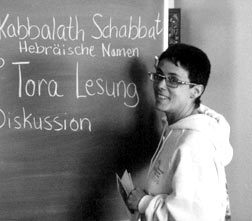Help from America
By Karolin Bendig
AUFBAU, June 7, 2001
Rachel Dohme finds help and support in New York
for the new liberal Jewish congregation in Germany.
Rachel Dohme is on the move. Whether she’s attending the opening of the first liberal rabbinical seminary in Germany — the Abraham Geiger College in Potsdam, or attending the Bienniel convention of the WUPJ in Washington, D.C., or giving a fundraising speech at a New York synagogue, her untiring efforts serve one goal: to secure the existence of the Jewish Congregation of Hamelin.
In 1982, Rachel Dohme married a German and left her home in the U.S., moving to the “Pied Piper” town of Hamelin. She was the only Jew in the Lower Saxony town of 60,000. She found the next closest synagogue in the town of Hannover. It was an orthodox synagogue and after the first visit said, “I knew this congregation was no place for me. I was not made to feel welcome.”
The idea to establish a liberal congregation in Hamelin came in 1990. That was the year that the first Russian Jewish refugees arrived. A small group was housed close to her home, and she began visiting them once a week with her three small children. At first there were twenty Russian Jews, but over the years the number grew to over 200.
 Rabbi Arnold Zoref from the Jewish Appleseed Foundation gives a Torah lesson. |
|
“It seemed natural to decide to formally establish ourselves as a congregation. We needed a venue to satisfy our religious needs,” said Dohme. “Many of the members of the Hannover Orthodox congregation label themselves as ‘non-practicing Orthodox.’ We wanted to be ‘practicing Liberal Jews.’ ” In 1997, Dohme and seventeen Russian Jewish men and women established the Jewish Congregation of Hamelin — the first Jewish congregation in Hamelin since the War. Hamelin followed the example of a group in Hannover that broke away from the Orthodox congregation to form a liberal congregation in 1995. Today the Hamelin Jewish Congregation is a stable and growing community of over 150 members — almost all coming from the FSU.
The Hamelin Congregation along with eleven other congregations are members of the Union of Progressive Jews of Germany, Austria and Switzerland. This organization, established in 1997, struggles for financial and legal equality with the Central Council of Jews of Germany. The resistence of the Orthodox congregation in Hannover against the development of the newly established liberal congregations was great. Dohme said, “We had to organize everything ourselves. In the beginning, we had no official help. We organized a Jewish summer camp for the children and youth of our liberal congregations (over thirty children attended last year) because they were denied the right to attend camps sponsored by the Central Council.”
 Rachel Dohme teaches Russian Immigrants. |
The financial situation was and is difficult for the Hamelin congregation. Most of the members are welfare recipients and unable to pay much in the way of membership dues. A small annual budget is consumed by rent and operating costs. Rachel Dohme found help through an American Jewish organization in New York — the Jewish Appleseed Foundation.
Executive director Rabbi Jo David said, “The story of the Hamelin Jewish Congregation is so inspiring. It shows that even without the financial means that most of us assume to be necessary, these people have developed a viable community.” Her organization has supported the Hamelin congregation over the last 1½ years. Rabbi David says, “A goal of the Jewish Appleseed Foundation is to assist small, isolated, or threatened Jewish communities all over the world. The Hamelin congregation fell into this category.” The Jewish Appleseed Foundation’s help is mostly financial, although Rabbi David also assists with moral and spiritual advice as needed. The JAF helps with the salary of the congregation’s social worker and carries the cost of the congregation’s Web site, www.JGHReform.org. Rabbi David: “We also help with traditional fundraising so that projects can be carried to fruition.”
Fundraising is done mostly in the U.S. In her presentations, Rabbi David addresses many American Jews’ lack of awareness of the rebirth and development of Reform Judaism in Germany. Rabbi David: “Many American Jews are aware of the situation of Jews in the FSU, but next to none of them know about Jewish Germany. If a Russian congregation had developed as quickly and as well as the Hamelin community, people would be thrilled. Because it has happened in Germany, many are disinterested. But we can learn from them — it should inspire American Jews.”
Rachel Dohme and the congregants dream of a synagogue and a spiritual leader for the congregation. The JAF is also working on solutions. Rabbi David is busy raising funds for the building of a synagogue in Hamelin. It will be the first liberal synagogue built in Germany since the War. Rachel Dohme sees the establishment and development of liberal congregations as a normal consequence and alternative to the Orthodox congregations in Germany. “Two hundred years ago, Liberal Judaism was established in Germany only to be destroyed by the Holocaust. Today, it is alive and well the land of it’s birth.”